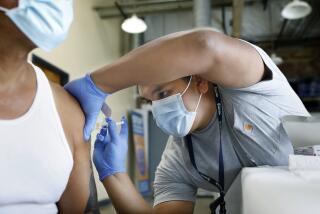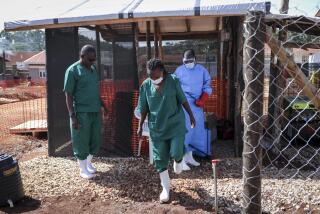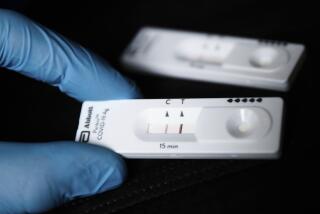Cheap, Speedy Test for AIDS Virus Found
- Share via
In an advance that could dramatically improve the effectiveness of AIDS control programs in Third World nations, California researchers have announced the development of an inexpensive, 30-minute screening test for the virus that causes the deadly disease.
But the researchers and a top World Health Organization (WHO) official warned that the marketing of such tests should be approached with caution in Western nations, because their availability may encourage mass screening for the virus before the consequences of such screening are adequately explored.
“There is no question that the technology is out there to develop a test that could be used in the home, like a pregnancy test,” said James R. Carlson, an assistant professor of pathology at University of California, Davis, School of Medicine and the leader of the research team. “The issue is whether you would want to (use the test) in the community.”
“In developing countries, these tests could be life-saving in many situations,” said Dr. Jonathan Mann, director of the WHO’s Special Program on AIDS. “But if we get to the point that you can test for (the AIDS virus) with a finger-stick and a drop of blood, it may create the temptation to use screening in developed countries without full social discussion and reflection.”
Officials said widespread testing for AIDS antibodies in Western nations would have implications for job discrimination, patient confidentiality and insurance. In many Third World nations, however, such considerations are overwhelmed by other public health needs.
The new blood test is one of a number of easy-to-perform, rapid tests for infection with the acquired immune deficiency syndrome virus that are expected to become available within the next year, Mann said in a telephone interview from Geneva.
According to the report by the UC Davis researchers in the British medical journal Lancet published today, the technique is designed to be used in screening blood, diagnosing patients and monitoring the spread of AIDS in nations that thus far have been unable to check for the virus because of the expense and special training and equipment associated with the current blood AIDS antibodies tests.
Need Little Training
The UC Davis test is based on standard blood tests for AIDS antibodies but requires only minimal laboratory facilities, less than 25 cents worth of materials and several hours of instruction to perform. “You need very little training,” Carlson said.
In the United States, the test could conceivably be used in doctor’s offices, although there are no current plans to seek marketing approval from the U.S. Food and Drug Administration.
A positive blood test for AIDS antibodies means that an individual is infected with the AIDS virus and capable of transmitting it to others through the blood or by sexual contact. But it does not mean that the individual has or will get AIDS. It is estimated that 20% to 30% of those infected with the AIDS virus will develop AIDS within five years.
The UC Davis researchers began their work in July, after two doctors returned from Kenya and discussed with their colleagues the importance of developing such a test.
Rapid Completion
“It took us about three months,” Carlson said. “It was just one of those projects which came together from the very first day.”
To perform the test, drops of a series of solutions, including the patient’s blood serum and a piece of an AIDS virus protein made by recombinant DNA technology, are placed on a white plastic card, according to the report. A bright blue color develops in positive samples. Negative samples have essentially no color.
“You basically add reagents (chemical solutions), wash them off and look for a blue color,” Carlson said. “We made it as simple as possible.”
The major expense in the test is for the synthetic AIDS virus protein, which is manufactured by Centocor Inc. of Malvern, Pa. The other materials cost about 1.5 cents per test, Carlson said.
By comparison, the standard “enzyme immunoassay” tests for AIDS antibodies are designed to be performed by trained laboratory personnel. They require chemical solutions that cost $2 to $6 per test and must be stored in a refrigerator. The results are interpreted by machines that can cost up to $10,000.
Confirmatory Test
As an additional safeguard, positive results in the United States are confirmed by a separate test, called the Western blot procedure. This confirmatory test is unlikely to be widely available in developing countries because it is costly and technically difficult to perform.
So far, the new screening test appears to be 99% accurate in a side-by-side comparison to a standard screening test, Carlson said. At Davis, its performance has been checked against the standard test on 118 blood specimens from the United States and 145 from foreign countries, primarily in Africa.
The need for a simplified blood screening test is particularly acute in some areas of Africa, where several million people are estimated to be infected with the AIDS virus. In urban areas of Uganda, Rwanda and Zaire, between 8% and 18% of blood donors have been found to carry the virus.
But before such simplified screening tests can be recommended for developing countries, they must be extensively checked in the field, as is now being done with the UC Davis test in Kinshasa, Zaire.
This is because such factors as impurities in the water, temperature and geographic differences in the AIDS virus may interfere with the accuracy of blood tests and lead to false results, Mann said. “In the early days of (AIDS virus blood tests) in Africa, there were a large number of false positives that confused the situation for years,” he said.
Debate Likely
For the United States, the social implications of simplified AIDS virus screening tests will likely be debated at a meeting called by federal health officials in Atlanta for Feb. 24-25. At the forum, there will be discussion of proposals for AIDS virus screening of marriage license applicants and of patients treated for pregnancy, sexually transmitted diseases or for admission to hospitals.
Widespread screening for the AIDS virus would be controversial. Some public health officials say this is an effective way to control the spread of the disease. Others believe that people who test positive may receive inadequate medical counseling and be the victims of discrimination. Moreover, the screening and confirmatory tests are likely to be less accurate when used in the general population--where AIDS virus infections are relatively uncommon--than in the groups known to be at high risk of exposure.
The AIDS virus, which attacks the body’s immune system, is transmitted by sexual contact, through the blood and from infected mother to her child. As of Feb. 9, 30,632 Americans had contracted AIDS and 17,542 had died. Between 1 and 2 million Americans are estimated to be infected with the AIDS virus, mostly male homosexuals and intravenous drug users.
More to Read
Sign up for Essential California
The most important California stories and recommendations in your inbox every morning.
You may occasionally receive promotional content from the Los Angeles Times.













